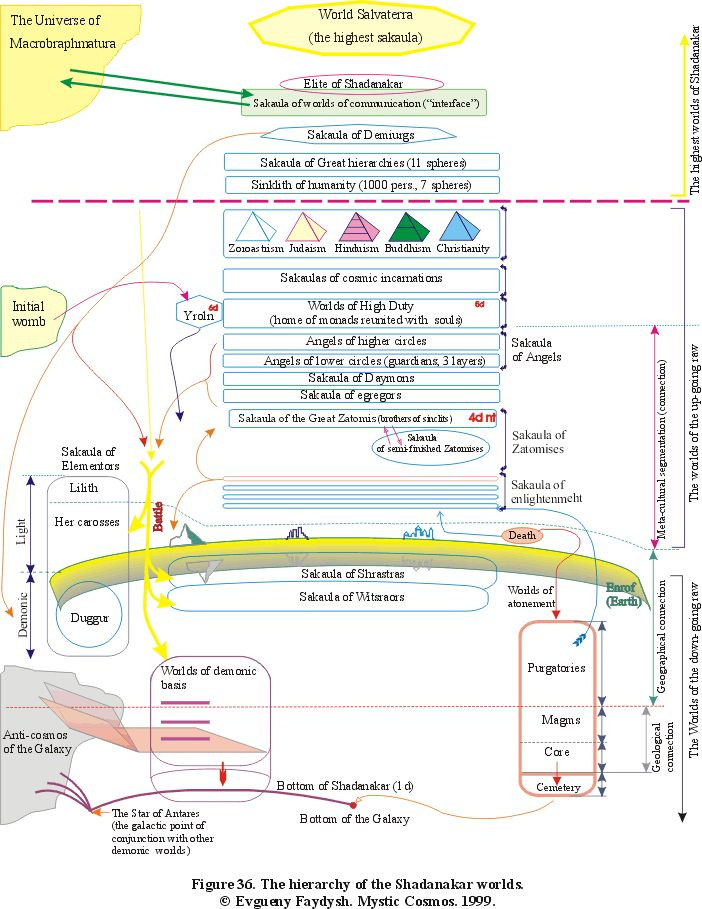Putting this in the entertainment section is a bold choice to make.
Rose of The World is a meta-philosophical/mystical text written by Russian author Daniel Andreev. In this text, Andreev lays out his mystical view of the past, present, and what he hopes will be a golden age in the future.
There’s a short blurb on the cover of my copy that I think summarizes it the best, despite still not being very clear.
A meta-philosophy of history, a revelation of worlds beyond, and a meta-religion for the future.
The last several chapters layout his spiritual worldview and structure, which I’ll touch on, but it’s not the sole focus of today.
I promise I’m not trying to induct anyone into a cult. This is purely intellectual.
Side Note: When doing some research, I discovered a news article about the death of a Russian model, Ruslana Korshunova, who attended a Rose of the World training center in Moscow. As far as I can tell, these two things, despite having a similar name in English, are not related. The training center she attended was an offshoot of an American cult called Lifespring and is all about “personality development.” This book does not at all mention “personality development.”
I first heard about Rose of the World from a review of the video game Quasimorph. The developer of the game cited Rose as a direct inspiration and used elements of Andreev’s spiritual ideas to flesh out his game. They are beyond that, not related.
I figured, why not? Why not dive into this weird book and then cover it for fun? I’ll learn something new and read something interesting.
Daniel Shubin, the translator for my copy, calls Andreev a complex genius. Is he smart? Sure. Is he a good writer? Maybe in his original tongue. When translated into English, Andreev has a very flowery and complicated way of writing. They're more succinct and simpler means of communicating his ideas. An editor was sorely needed for Andreev and Shubin. Furthermore, Andreev routinely makes interesting, if obvious, observations, poignant criticisms, and puts forth bold ideas. Does that make him a complex genius? Only kind of.
As much as this hurts to say, I’ll have to occasionally criticize Andreev and what he discusses. It’s the man’s life work, and he risked a great deal to write it all down. I'm still going to criticize it and occasionally poke holes. I’ll dive into it in more detail as we come along, but many of his critiques may have once been biting but are now slightly banal.
For the sake of my sanity and for the length and timeframe of this article, I’ll only be covering the first two chapters, which I believe are the easiest to understand and the most politically significant. We’ll get a peek into who Andreev is as a person and what he hopes to achieve with this work.
“The first two chapters? You can hardly know a book from the first two chapters.” Yes, but the later chapters contain phrases like:
“Navna is the bride of the demiurge of Russia and the captives of the Zhrugrs.”
And I actually figured out what that means.
Daniel Andreev The Man
Daniel Andreev is an optimistic man. Considering what happened to Andreev over the course of his life, it speaks volumes to his core character and outlook. According to the biography in the first few chapters, Andreev suffered from spondylarthritis, or an arthritic spine. The book claims that he had to wear an iron corset to be able to function. He was conscripted to serve in the Red Army during World War II and was assigned to a funeral corps. He would go out into a field, ID the dead, then bury them in mass nameless graves. It sounds horrible in the colder parts of the year and downright revolting in the summer months.
Andreev was arrested in 1947 for his anti-Soviet poem Wanderers of the Night. He languished in Soviet prison from 1947 to 1957 It was during this imprisonment that he would begin having visions and experiences of a world beyond our own. It’s from these visions and experiences that he wrote Rose of the World. Throughout his years of burying bodies in the Second World War and suffering in a Soviet prison, Andreev maintained his hope and optimism for both humanity and the future. He dreamed that we could build a world-wide society on the basis of the good in humanity and spiritual growth.
The Book
Andreev describes his spiritual worldview in a rather beautiful way. There is a Rose with its roots in heaven blossoming here on Earth. Thus, the title Rose of the World.
Had Andreev written this book in America, he might’ve started a serious cult. The fact he wrote this in a Soviet prison in the atheistic USSR means that he couldn’t even try. The only reason we’re able to read this book at all is because of copies made without the knowledge of his widow. Andreev is skeptical about whether or not his book will survive or even be read, but he states.
But if it will reach at some time even a handful of persons, whose religious thirst will compel them to read it to the end, overcoming all of its difficulties in comprehension—the ideas inherent in it—it cannot but become seeds that will sprout in strange hearts.
This idea and later sections where Andreev reflects upon the text he’s written and applies some self-critique imply, at least to me, genuine belief and a level of sanity and intelligence. Had he started a cult, we could call him greedy and manipulative. Had he not had some level of self-awareness, we could call him a madman. Trust me, he is still very much out there.
So what did Andreev experience in Russian prison? Shadanakar.
Pardon me, that’s the Russian version. Here’s the English version someone cooked up.
To oversimplify a very complicated set of ideas, Andreev’s spiritual worldview is based on the idea that there are spiritual layers and extrapolations around and beyond the Earth. What goes on around Earth is influenced by and influences the beings that inhabit each of these layers.
If you really can make sense of all of that up above, call me; I have a lot of questions.
Enough of the trippy mindfuck. Let’s dive into the actual meat and potatoes.
Rose is a fundamentally anti-violence and anti-tyrannical book. Andreev even goes as far as to state that they are the two fundamental evils of the world. He puts forth this idea,
The most consuming satire and the most fiery sermon are fruitless if they only slap evil, and prove that what is good is good and what is bad is bad.
Many of his observations are poignant, yet people would be correct to call them surface level. Daniel Andreev’s writing wouldn’t look out of place in a Facebook boomer’s post, but it’s the time that he makes these assertions that make him unique.
He asserts, for example, that in the 18th and 19th centuries, governments began to change shape. Some governments worked to make their citizens more dependent on the government, while other governments changed to value economic growth and personal liberty. In the 20th century, these kinds of governments tried to become worldwide, whether that be nazism, communism, or liberal democracy.
He then goes on to point out that the world we live is deeply and irrevocably interconnected. This is both a boon, as it’s a step closer to his imagined “state,” but it also provides a pit fall.
Yes and indeed, where is the guarantee that a great ambitious man will not appear at the head of the supra-state [United Nations], and science to benefit him as belief and virtue, as weapons for the transformation of this supra-state particularly into a monstrous machine of torture and psychological crippling, of which I speak?
A man ahead of his time.
What was his vision for the future? What utopia was Andreev cooking up?
In a weird precursor to the Christian apocalypse, Andreev believed the world would be consumed in nuclear hellfire and World War III. After this (in the 23rd century I’m not kidding) would come the worldwide Fraternity or a spiritual utopia. In my notes, I initially called the Fraternity an “ethical theocracy” (he addresses this criticism, and this won’t be the only time he does), but I later changed my description to “spiritual communism.”
To put it very simply, the Fraternity would be a world-wide government that would rule through deeply ethical and religious leaders who would emphasize spiritual development and personal growth over economics or racial purity.
The Fraternity won’t spread through violence and conquest but rather via example. The Fraternity would be such a noble government filled with the best examples humanity had to offer that it would spread across the globe via cultural osmosis.
At this point, I had a very obvious criticism to make. You can’t really build a society of people who are spiritually good and moral. There will always be the corruptible and the shitheads who will happily ruin it for everyone.
Those who are unable to see the best in a person are those who will blame the Fraternity of the unreality of their methods. Their psyche is coarsened and consciousness is decayed in the atmosphere of state arbitrariness.
It isn’t the greatest refutation of his critics. Yeah, I suck as a human being; how are you going to address the corrupt and malicious? I thought it interesting to point out and it further demonstrates the optimism of Andreev.
“Your psyche is coarsened and your consciousness decayed,” is a helluva comeback, though.
He also addresses my idea that the Fraternity is a theocracy. Although it very much appears like one. Theocracies are led by priests or head religious figures. In the Fraternity, all the world governments and churches will blend together (I’ll get to that idea) until they become the same kind of institution, but it won’t be led by priests but rather representatives from the citizenry.
The Fraternity has to balance those two ideas. Representatives, who are the best and most qualified, lead the Fraternity, but they aren’t necessarily religious leaders. Maybe this has to do with ideas about people who go into the clergy and spiritual leadership. He writes a great deal about monastic work and study. It’s possible that those who are engaged in such work need to be allowed to focus while others govern.
In Andreev’s writing government and religion would come together into something entirely different; maybe the idea of priests, but not their place, will radically change. He works this in with his ideas about history. He writes that the dominant religions of the past lacked the material means to uplift everyone and fix problems, while the governments of today lack the spiritual means. This institution, which Andreev calls inter-religion, would combine the means and the ideas to achieve both.
He is rather forward thinking, if vague. There are always new technologies and ideas coming about that we haven’t thought of yet. The problem isn’t purely technological, but also in mindset. We will all have to care for each other and our needs in this Fraternity.
While the citizens of the United States will have to remember that they consider themselves Christians and that Christianity is incompatible with bestial hate toward any other race, and including the black.
Rose has several seemingly contradictory ideals that Andreev puts forth. I don’t have any refutations from Andreev in my notes, and I can’t find any in an additional read. We will need to learn to lift other people up and care for the needs of people on the other side of the globe. Then Andreev writes an impassioned paragraph about how important the individual is, something he calls the absolute value. The raising up and the expression from the individual is uniquely important.
Maybe I’m making up this contradiction myself with my basic bitch understanding of individualism and collectivism.
I’ll offer my own rebuttal; I don’t speak for Andreev, but I’ll give it my best shot based on what he writes. The individual isn’t subordinate to the collective, but a member of which they need to acknowledge. We are all human beings, and all of humanity is made up of individuals. The freedom of expression isn’t necessarily about criticism of power structures but creation and learning. Simultaneously, the growth of one person can help others around them grow.
But what do I know? My psyche is coarsened, and my consciousness is decayed.
I do want to include this quote, and it’ll probably become a mainstay moving forward.
Because every creative achievement, other than demonic, that is performed on your own behalf and for yourself is a divine accomplishment.
The last idea I want to touch on is that every religion can exist in the Fraternity. He is not talking about every flavor of Christianity, he is talking about every religion. Shubin goes on and on about how well read Andreev was when it came to other religions, like Hinduism and Islam. Andreev believed that he himself had been reincarnated several times over the course of history, despite the fact he was a devout Orthodox.
In his view, all religions are simply petals on the spiritual rose. There is some credence to lend to this idea. The existence of ideas like the golden rule being a pervasive idea throughout many religions and ethical systems.
He writes (in a section that I had to reread several times) that religious beliefs can be retaught and reconceived as analogous to other teachings in other religions or as ancillary to one's own. He puts this through the lens of the cult saints in Protestantism and Islam. I’ll do my best to convey this idea, it’s not clear.
Protestants and Muslims don’t believe in saints, but that doesn’t mean that some people don’t need and appreciate them. You can’t believe in the concept of representative governance and refute the ideas of saints. The existence of reincarnation and Shadanakar means that there is a special place for these particularly virtuous souls.
I think. If you want to take a stab at it, go right on ahead.
As I stated earlier, there is so much more to Rose of the World. Andreev dives into Shadanakar and the beings that inhabit it.
I would be interested in another translation. From my understanding, Russian is a notoriously difficult language to translate, and Shubin does a good enough job. I’d just like to see someone else and an editor take a stab at translating this into English.
Daniel Andreev died of a heart attack in April 1959. He was survived by his wife Alla who would go on to hide his book, only giving it to close friends to make copies for preservation. Alla would die in 2005 from a fire.
Do I believe in the world of Shadanakar? No. Do I find Andreev’s ideas to be interesting and worth further study? Yes. If you’re interested, there is a free copy in the internet archive. If you want a physical copy, you can pick it up on Amazon for $26. If you want some further reading from an academic, check out this piece by Mikhail Epstein.
Till next week.







As somebody who has only ever been peripherally aware of the book and it's cosmology, I'm glad somebody on here is talking about it. Another source I enjoy is the deviantart account Vanga-Vangog, a Russian speaker who has drawn a couple figures from Shardanakar and specifically The Worlds of Retribution.
https://www.deviantart.com/vanga-vangog/art/The-Worlds-of-Retribution-Roza-Mira-912256462